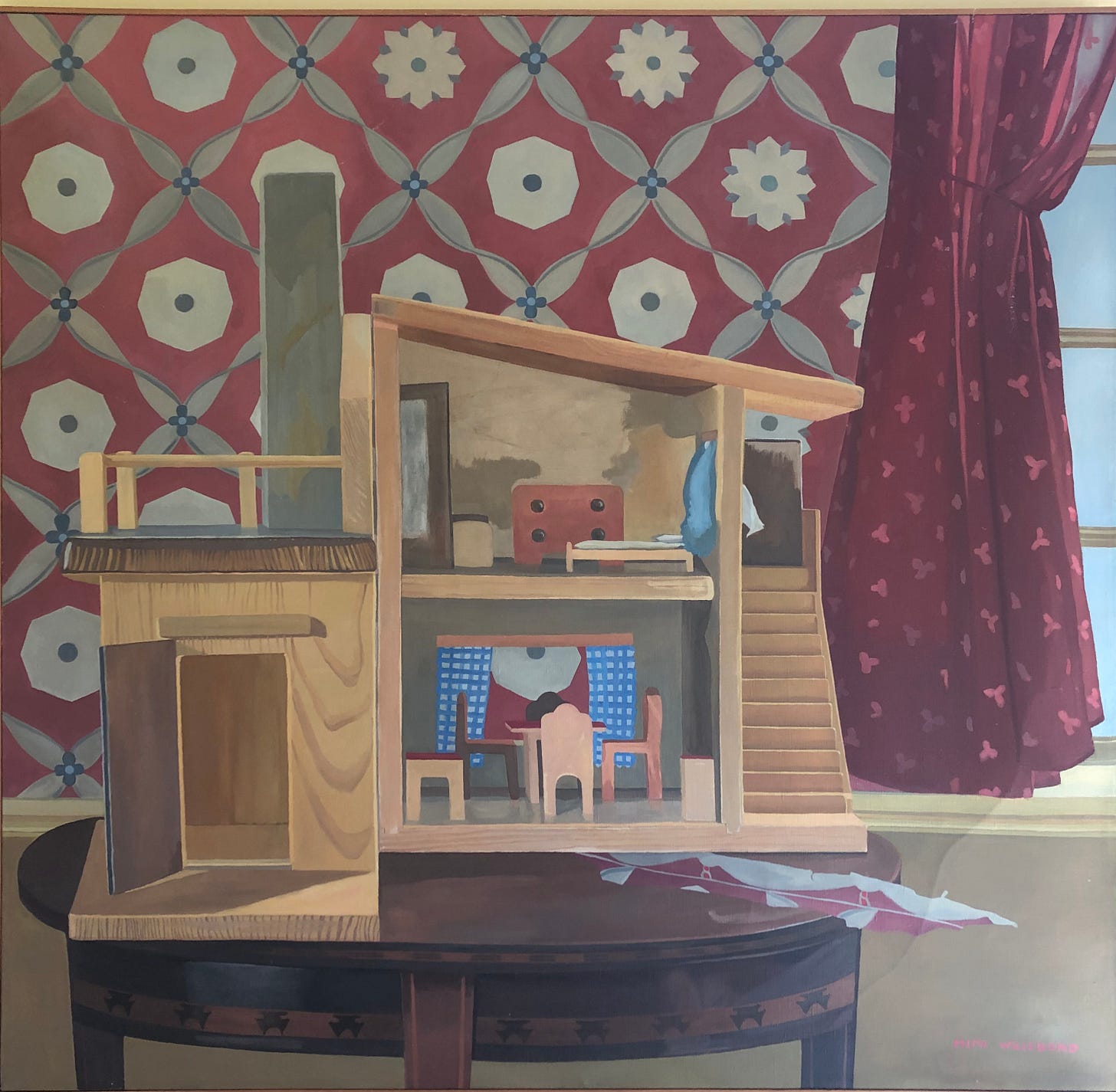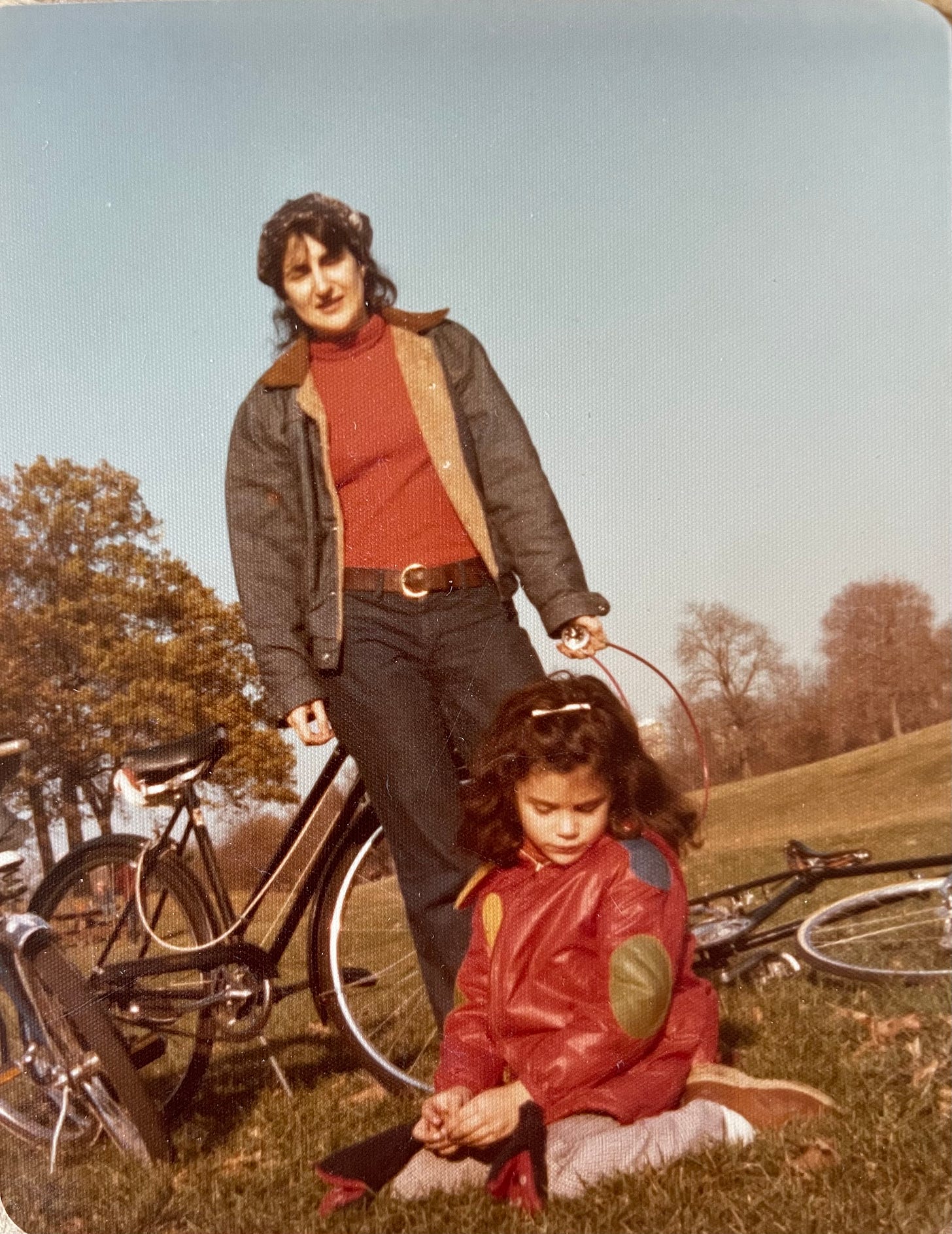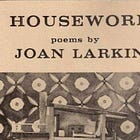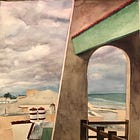Erica Jong, My Mother, and Me
A reckoning with my writer-self and my mother, inspired by Molly Jong-Fast’s recent bold act of memoir.
I should probably finish The New York Times (NYT) article about Molly Jong-Fast’s new book, How to Lose Your Mother: A Daughter’s Memoir, before I start writing this post. But every time I try to read Alexandra Alter’s article, “The Devastating Book Erica Jong Always Knew Her Daughter Would Write,” I begin writing compulsively. So I’m heeding that call.
Don’t writers drop everything to write? Surely, that’s the case with the prolific writer and feminist icon Erica Jong and her daughter, Molly.
Reading Alter’s article, I feel I know Molly and Erica, though I’ve not met them or read their books. Growing up, however, I was always dimly aware that Erica Jong was once a friend of my mother.
Erica Jong is famous for writing Fear of Flying, a novel about a woman seeking casual sex that ignored all filters applied to women writing about sex in the 1970s. Erica coined the term “zipless fuck,” and sold 20 million copies. And then she wrote something like 20 more books.
Erica thinly veils her life in her fiction, as well as that of her daughter, Molly. “Whenever a stranger or acquaintance seemed to know intimate details about her,” writes Alter, “like her bratty behavior as a teenager, or her struggles with drug and alcohol addiction — Ms. Jong-Fast would freeze.” 1
(I remember my mother reading Fear of Flying and saying “Oh, Erica..” again and again, shaking her head with some kind of weary recognition.)
Now Molly has written a memoir that also holds nothing back, exactly as her mother always said — and still says — is the only way to be a writer.
“‘When you’re a writer, your life is really an open book,’” she tells Alter, “‘and that’s true also for your child.’”2
Yet, writers hold back all the time. I like to say that a memoir is an erasure poem. A memoir carves a narrative out of an entire life’s worth of material, a process that makes choices and obscures as much as it reveals.
According to the article, Erica plans to read her daughter’s memoir, but her daughter wrote it knowing she would not.
Erica, at 83, is declining with dementia.
As a daughter of another fierce NYC feminist who died with dementia, and as one who wrote a memoir to survive my mother’s harrowing delusional spiral, I am stunned and dazzled by Molly’s guts to write and publish hers while her mother is still able to speak with The New York Times.
I admire that chutzpah. And I wish I did know Molly. I’d take her for coffee to cry and laugh about growing up in the shadow of powerful, creative women.
And so, I’m sad to learn that this is Molly Jong-Fast, the pundit on MSNBC. She’s famous and as unreachable as her mother was a few years back, when I was digging through my mother’s things and finding books, notes, and manuscripts by Erica.
In 2020, I sent an email to Erica’s assistant. “Mimi Weisbord’s daughter here (old friend of Erica’s),” read the subject line (I find in my Gmail). I was then researching for my book.
I never got a reply.
Now I read that a few years later, Molly had to move Erica and her stepfather when their apartment reeked of urine (the kind of detail that I have shared, though it fills me with guilt).
I wish I could have known Molly then, too. Navigating elder-care in New York City is a special place in hell. I’d have had great advice for her.
I’d also have shared what I learned from Dotty Attie, the feminist painter who is my mother’s second cousin: It was my mom who introduced Erica to feminist consciousness-raising (CR) in the early 1970s, then the portal to the Women’s Movement in New York City. This was years before the publication of Fear of Flying, when Erica was writing poetry.
For me, that is a lovely bit of history wrapped up in the role my mother had at WBAI-FM during those years. I don’t know if it would be of interest to Molly, but as a feminist daughter of a feminist mother, I’m enthralled by this Women’s Movement history, though it seared me to the core. Every member of my mother’s women’s consciousness-raising group left her husband or partner. My parents split in 1972, the beginning of their long-standing war. I can see in the NYT article that Erica and her husband, Jonathan Fast, split when Molly was three. But that was around 1980.
While my parents’ marriage was falling apart, my mother was producing “Women Poets Reading,” the radio platform she created for feminist poets. She invited Erica to read, a great opportunity for emerging women poets of the era, and a role my mother relished.
Here is the recording of Erica Jong by Mimi Anderson. I just found it — a recording of both our mothers’ voices in 1972.
My mother recruited Erica to a marathon-long consciousness-raising meeting that was intent on spawning more CR groups in the city. Dotty Attie was also invited, and she credits my mother with her feminist awakening (as does poet Joan Larkin).
Dotty tells me Erica would only join a CR group with other writers. She says Erica and my mother remained friends for years, and she remembers that Erica came along for dinner out after a gallery show opening of my mother’s work.
I bet that was 1976. I remember that night on the corner of Prince and Green in SoHo. My mother’s paintings featured my dollhouse.
It matters to me that my mother not only painted but helped ignite the passion of women who went on to write and create art that challenged the canon and took aim at the patriarchy. Every day, in fact, it matters to me more.
But Molly’s memoir describes Erica as “a fame-chasing, alcoholic narcissist who had little time for or interest in her daughter, except as ‘her accessory’ or as a subject she could mine for her books.” 3
I wonder if that tendency to unabashedly mine real lives for content is why Erica insisted on a CR group of writers? So their group rules might stipulate, “Nothing said in the room stays in the room.”?
Cleaning out my mother’s loft, I found a manuscript, a short story by Erica, scribbled with notes. On the first page, the protagonist gives examples of names that sound “normal,” and in that list is the name “Elizabeth Anderson.”
As Eliza Anderson, reading that gave me great pause.
The story’s protagonist, as I recall, is studying Sylvia Plath and is married to her former shrink. I saw right away that my mother had a lot in common with Erica. Mimi was obsessed with psychoanalysis and produced a radio documentary about Sylvia Plath for WBAI.

Molly Jong-Fast never had a chance at privacy. Her mother breathed out to the page what she breathed in all around her.
Maybe Erica considers Molly’s act of memoir as inevitable?
“[Molly] recognizes that some will see her brutally honest, scorched-earth memoir about her mother,” Alter writes, “as an act of literary retribution. She doesn’t entirely disagree. […] ‘I sold out Erica Jong, but it’s sort of in honor of her.’”4
Reading Alter’s article (I finally finished it.), I confront the choices I’ve made while writing about Mimi, the ways I carve out her and my history on Substack, and what I’ve obscured.
I fear I’ve romanticized Mimi here.
Am I trying to recover our relationship (my hopeless childhood quest)? Am I afraid of disappointing readers? Am I still afraid of her?
To all of it, yes.
And this: writing on Substack is different from writing a book. On Substack, readers often dip in and out of reading an individual writer. Each published piece must stand on its own.
And that is stressful for this daughter of wildly complicated parents.
The posts that exalt my mother can leave me feeling vaguely cheap. The ones that excoriate her leave me gnawed with guilt.
The same applies to many of the pieces I publish about my father. (Sort of. I was never afraid of Lennart, only his second wife.)
Of course, I still need to read How to Lose Your Mother, but from what I can tell from this article, Molly and I had mothers who boasted about their relationships with their daughters (idealized in that era), even as our experiences with them were often devastating.
Hers made shit up about her parenting. (Yes, Erica wrote nonfiction, too.) Mine nurtured her resentment to sharpen her rage.
My mother declared loyalty to her kids, yet often resisted lifting a finger to parent.
If I asked her for something, she’d tell me to ask Dad, who owed her an invisible debt that was never directly articulated.
Dad would cave, sympathetic to me (or afraid of her, I’m no longer sure). Yet she wondered why I seemed to love and appreciate him more.
My brother and I kept our heads down and yearned for more time at our father’s; he was relatively hands-off and even-keeled with his brand of neglect and narcissism. Her rages and jealousies splattered the walls.
Since her death, since digging out her loft, since writing my memoir (a manuscript separate from this substack), I see it clearly, and much more. I see how she was dependent on child support from my father and more from her parents, yet spent a fortune on psychoanalysis and art supplies (and sometimes grass and astrology), yet rarely on clothes for her adolescent children. In the 1970s, she would take lovers to the country house we had in Massachusetts — hers, after the divorce — while she left us with our father. We loved that house; this explains why my brother and I rarely saw it in the two years before she sold it. She also sent us to camp during her assigned summer months and made Dad pay for it. Meanwhile, she enthralled younger women artists with her mirage of independence.
In Alter’s article, Molly says that Erica, without dementia, would not have been happy with what she’s written in How to Lose Your Mother: A Daughter’s Memoir, but that it would certainly have pleased her to have a book focused on her.
In my memoir, I write regrets that I’m giving Mimi what she’d always wanted: my complete attention. (“Of course you are writing about me,” I hear her in my head. “I’m fascinating!”)
Frankly, it’s frustrating to know that my eyes are still trained on my mother. Shouldn’t more of my life be mine? (She’s been dead five years for fuck’s sake.) But her paintings will forever loom on my walls.
I toggle between the gift and the curse of them — my lifelong dilemma.
And then there’s this: in the loft, I found 60 pages of a novel my mother had been writing in the 1980s.
I’m willing to bet she wrote it, jealous of Erica for spectacularly capitalizing on her life’s stories and talent. But perhaps more so of Nora Ephron and her novel, Heartburn.
As with Heartburn, my mother was also writing a book about (and for) revenge.
“‘A [woman] ought to be a friend to [her] friend, and repay gift with gift. People should meet smiles with smiles and lies with treachery.”’ — The quote, found at the opening of Mimi’s manuscript, is adapted from the Poetic Edda.
The good news for my psyche is that while my mother’s unfinished novel is intentionally and transparently autobiographical, her primary target is not my father. Her primary target is the minimalist sculptor, Fred Sandback, “Ted” in her pages. Fred broke her heart in the late 70s with various infidelities. (I wrote about their breakup in Minimalism.)
Yet, while Lennart Anderson is not her target, “Andrew” is the ex-husband who explains her vulnerability to a man like “Ted” — a lover who took interest in her mind, talent, and sexual pleasure (yes, there’s more here than I ever wanted to know).
And she does animate scenes from the end of her protagonist’s marriage. Even, to my astonishment, the scene she confessed to me in 2016 (after my father’s death, and before her dementia).
I thought it took her all those years to find those words, but she’d already drafted it and submitted it to literary agents in the 80s (with no success).
She explained to me that he’d threatened her with divorce before she’d ever raised it. The divorce, she implied, did not stick to her.
She’d described to me how she’d lain face-down on the tile-floored bathroom on our brownstone’s second floor, listening to his threats to leave, terrified of how she’d raise small children.
She cried bitterly as she hit her head over and over against the floor.
Just when I’m starting to paint again, she sobbed.
She remembered the previous winter when she was recovering [from a chest infection] and had somehow gotten Andrew to a movie in town together. Afterwards, she had looked longingly at the coffee shop across the street, but Andrew made a rule of never staying up late (with her). She was always forgetting Andrew’s rules:
ARTISTS don’t stay up late if they want to paint the next day. (Andrew painted every day.)
ARTISTS don’t spend weekends in the country.
ARTISTS don’t sit in coffee shops after movies, etc., etc.
In fact, she was even forgetting that she was an artist. Maybe she didn’t qualify because she wanted to break the rules.
My mother stitched me with questions and then left breadcrumbs and a treasure map to their answers. Answers I am still finding.
Of course, I am paying attention.
And of course, I am writing.
After all, my name in her novel is “Erica.”
Related posts:
Alter, Alexandra. “Molly Jong-Fast Offers Unsparing Account of Mother Erica Jong’s Decline in New Memoir.” The New York Times, 31 May 2025, www.nytimes.com/2025/05/31/style/molly-jong-fast-memoir-erica-jong.html (accessed June 3, 2025)
Ibid
Ibid
Ibid











Amazing piece Eliza! Your writing is always so powerful. 🙏🏼
These discoveries opened something in you. Such vulnerability